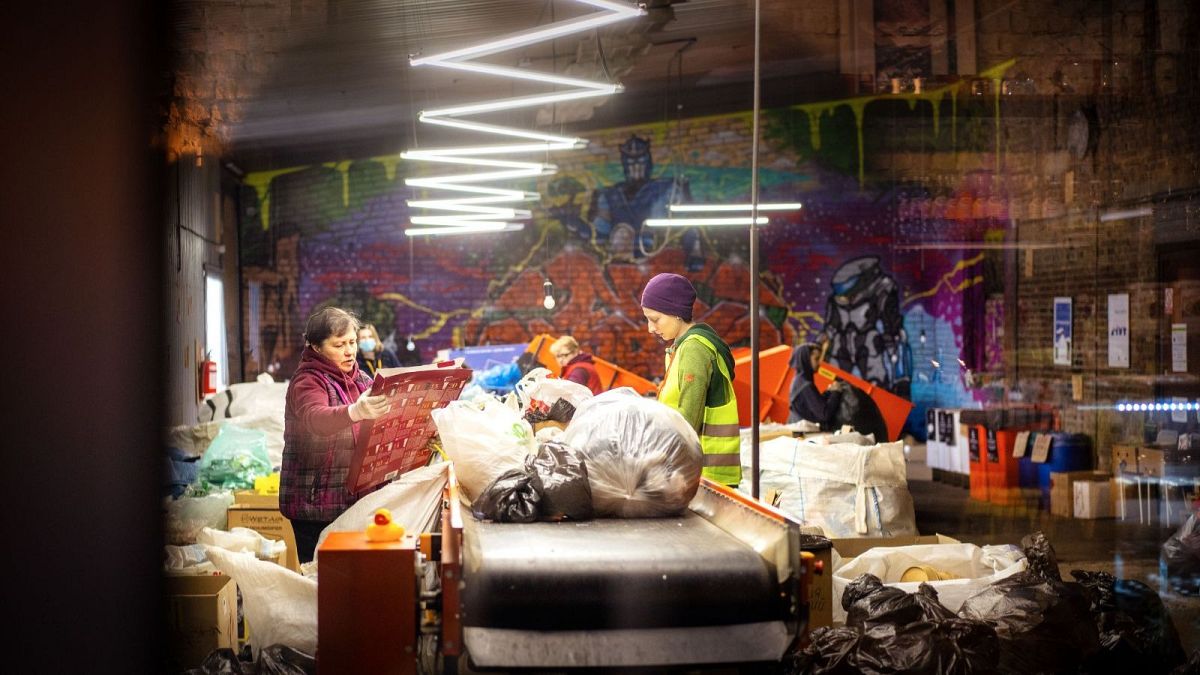It all started in 2014 when Dave Hakkens, then a student at the Eindhoven Design Academy, released his design for a plastic recycling machine to the world for free.
The aim was to make plastic recycling available to local communities at scale by lowering the technological threshold for success with easily replicable and repairable machines.
That year, three people independently replicated Hakkens’ machine. Within a short time, the Precious Plastic project was born.
‘Teach a man to fish’
Everything the project makes – from machines, tutorials and tools to product designs – is shared freely online under open-source licenses, enabling anyone, anywhere, to start a plastic recycling project. Machines can also be purchased and shipped globally, or, for the DIY-savvy, replicated, repaired and improved upon with off-the-shelf materials.
Four iterations of the original machines later, Precious Plastic is now a global community of more than 2000 registered plastic recycling initiatives across 56 countries. Community members not only tweak and improve upon the machines, but are also setting up business and infrastructure for plastic recycling while raising awareness locally.
“At the end of the day, what we wanted was more plastic recycling,” says Jerry de Voos, who joined Precious Plastic in 2017 while on a gap year between his Bachelor’s and Master’s in Industrial Design to help develop version three of the machines.
“Often, we had an idea from what others had done or what we thought the community would benefit from,” explains de Voos. “Then we’d seek funding and when we were happy with the results, we would share them online.”
Plastic waste remains an intractable problem
By 2050, 99 per cent of all birds will have eaten plastic.
Plastic waste remains one of the biggest environmental issues facing the planet. It’s estimated that less than 9 per cent of all plastic is recycled, with the rest ending up in landfills, nature or the ocean.
The consequences are particularly felt by wildlife and vulnerable ecosystems, with the actual impact of issues like microplastics only recently becoming evident. For the first time in 2025, an Italian study found microplastics in several women’s ovaries, raising concerns over their impact on fertility rates.
Though the technology for plastic recycling is out there, the expansion of the recycling industry remains stagnant. More often than not, recycled plastics rely on infrastructure that remains immature or non-existent in many countries. Virgin plastics manufacturing also remains significantly cheaper than high-quality recycling.
Add to this an increase in energy and labour costs, and what you’re left with is a recycling sector under pressure, with investors unwilling to bet on the growth of the sector as it is.
But rather than wait for the established market players to turn plastic recycling into a viable business proposition, Precious Plastic decided to lower the threshold for new players to enter the game.
“Precious Plastic was one of the first projects where you could have small, personal solutions to bigger challenges and thereby make people feel like they could contribute to solving the issue,” explains de Voos. It has also shared best-practice business tools for those wanting to make a living out of plastic recycling.
As a result, several startups and businesses around the world are scaling plastic recycling at the local level.
In Singapore, Plastify has kickstarted a PET-bottle collection scheme and collaborates with hospitals to turn medical packaging waste into products, including official merchandise for the F1 Grand Prix.
In Turin, Italy, Plastiz turns everything from old traffic lights to coffee pods into sheets for architecture and interior design projects.
And amidst war, No Waste Ukraine is “trying to make waste sorting a cultural norm and to replace the old Soviet-era shame, when recycling was seen as a sign of poverty, with a new sense of pride and identity,” says project lead, Khrystyna Baranovska.
Since opening a Precious Plastic workshop, No Waste Ukraine has been able to manifest café furniture, notebook covers and branded gifts made from recycled plastic.
Plastic recycling requires long-term, multi-stakeholder commitment
While donations and occasional funding have supplied materials, workspace and sustenance for the community, Precious Plastic owes much of its success to volunteer work.
The reliance on altruism is both the key to its success and the fragile pillar of its foundation. When de Voos was active, “we were 12 people volunteering almost daily for free,” he says. “But at some point, people have to pay the rent.”
When a new version has been released, the project dies down, with version five currently on hold due to financial trouble.
De Voos is not worried, though. “The machines are out there and they are as relevant now as back then,” he says. Anyone can pick up where Precious Plastic left off.
Though Precious Plastic’s global community has moved plastic recycling significantly closer to the finish line, “it would be great if there was greater appreciation for people working in the recycling industry, and if the government would share the responsibility and back local initiatives,” he adds. .
Recycling is only as good as the plastic produced
Circularity in plastic requires change from start to finish. Even with hyperlocal efforts and open-source technologies, at current production rates, recycling efforts simply can’t catch up with virgin plastics.
Around 460 million metric tonnes of plastic are produced every year, according to the United Nations Environment Programme, of which most of it is designed in a way that makes 1:1 recycling difficult, if not impossible
Alternatives are on the rise, however, from Notpla’s edible packaging in the UK to a Japanese alternative that dissolves safely in sea water. There are numerous examples challenging the notion that virgin plastics everywhere are a must.
What’s left to be seen is whether global leaders can get behind a plastic treaty this August that will finally see the plastic industry shift towards more circular designs and production. If so, plastic recycling at scale could become a thing. If not via big industry players, then evidently via grassroots initiatives like Precious Plastic.

